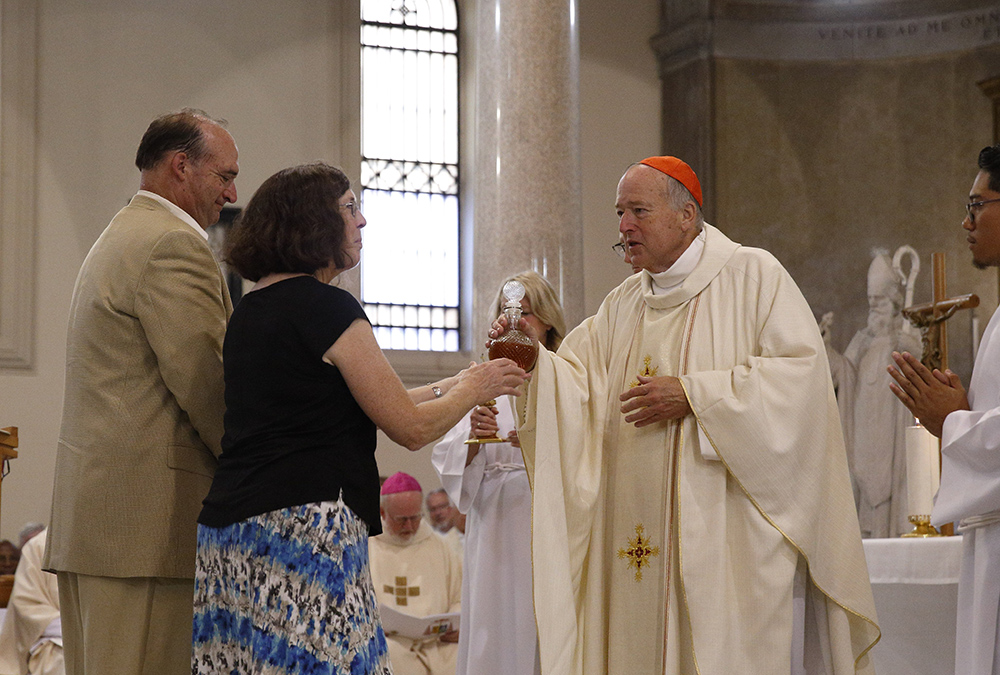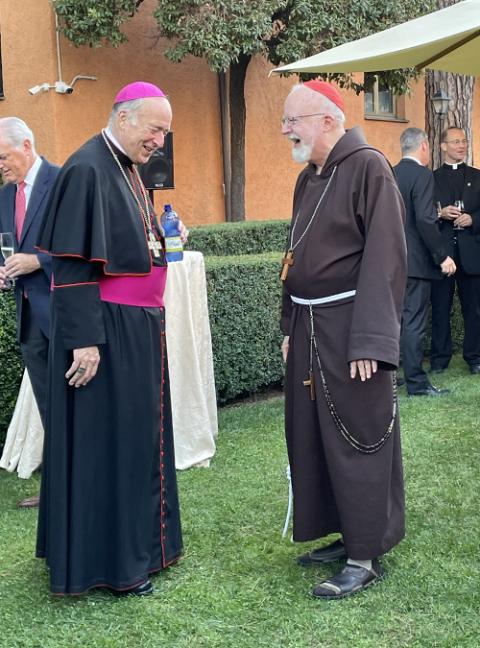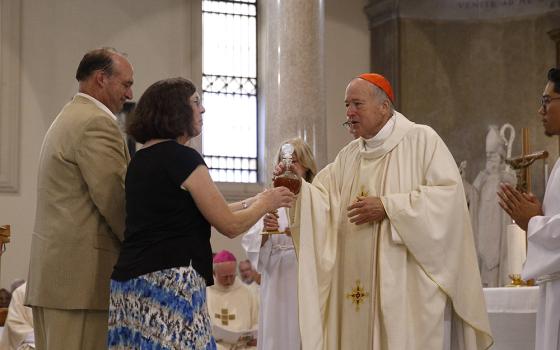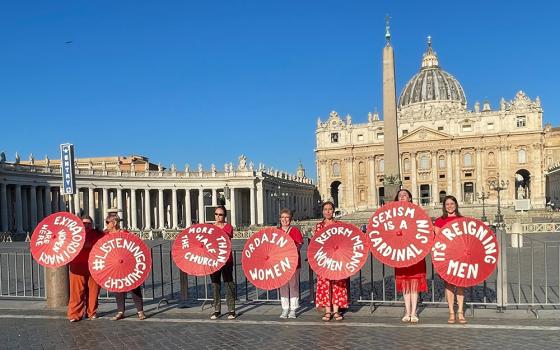
New Cardinal Robert McElroy of San Diego accepts offertory gifts from his sister, Kathy Schreiner, and brother, Walter McElroy, as he celebrates a Mass of thanksgiving at St. Patrick's Church, official home of the U.S. Catholic community, Aug. 28 in Rome. (CNS photo/Paul Haring)
As you can imagine, I am not often speechless. But when I finally reached the end of the receiving line at the U.S. ambassador to the Holy See's residence to greet Cardinal Robert McElroy on Aug. 26, I couldn't find the words. It has been three months since the news of his elevation to the cardinalate arrived — three months for it to sink in — and I was still not sure what to say.
Archbishop John Wester of Santa Fe, New Mexico, knew what to say. "Ecstatic" was how he described what so many Catholics were feeling at this moment. Wester spoke at a dinner for McElroy's family and friends after the Mass of thanksgiving on Aug. 28. In discussions with pilgrims from San Diego, friends of McElroy's from San Francisco or from college and seminary, and his brother bishops, "ecstatic" was the exact word.
For progressive Catholics, McElroy has been one of a handful of bishops who would go the extra mile, make statements of support for gay Catholics, push back against conservative efforts to hijack church teaching for political ends and participate in conferences on climate change. The Catholics whose hearts have been warmed and encouraged by McElroy's leadership for many years were among those "ecstatic" at the appointment.
For Catholic intellectual leaders, "ecstatic" was the right word too. "It is something of a truism that theologians and bishops live in different bubbles," Jesuit Fr. Mark Massa, director of the Boisi Center for Religion and American Public Life at Boston College, told me. "The person who was best able to burst those bubbles was John Courtney Murray. Well before Vatican II, Murray saw the complexities and the promise of being a faithful Catholic in America. Most intellectuals I talk to, are delighted that McElroy is now a cardinal because he did serious intellectual work on Murray at the beginning of his ecclesiastical career."
Massa added, "McElroy has the intellectual firepower that can use Murray's insights in a pastoral way."
Cathleen Kaveny, who teaches both law and theology at Boston College, agreed. "Most people think there is a sharp divide between the intellectual life and the pastoral life. Cardinal McElroy is living proof that this is not necessarily the case," Kaveny told me. "He takes his great knowledge and applies it to the particularities of the situations that are before him, situations of great spiritual and material need. So, he shows that, at their best, Catholic moral theology and Catholic social teaching are not words delivered from an indifferent above, but spring from the loving heart of the church."

Cardinals Robert McElroy and Sean O'Malley speak during a reception hosted by the U.S. embassy to the Holy See on Aug. 26. (Courtesy of Paulist Sr. Rose Pacatte)
McElroy, however, is not a man who lives in his head. In his remarks at the celebratory dinner, Wester detailed the key relationships in McElroy's life as he only he could, having known the new cardinal since his youth. Wester summed up those influences: "Love nurtured in the family, care of neighbor in the parish, brotherhood of the priesthood in the Sulpicians, gathering of people in San Francisco, resilient, ever adapting, bold and approachable theology prompted by the Holy Spirit and championed by three stellar archbishops: these are integral parts of the legacy bequeathed to Cardinal McElroy."
At the consistory on Aug. 27, it was remarkable to see cardinals mixing together so easily. They come from different places and from different generations. They have a wide variety of personalities, some being introverts, others extroverts. They have all sorts of interesting connections with one another. For example, McElroy was a delegate to the 2019 synod on the Amazon, and the only other U.S. delegate was Boston Cardinal Sean O'Malley. But there is a prior connection too: McElroy was once the priest secretary to San Francisco's Archbishop John Quinn. O'Malley told NCR that in 1979, when Quinn was the president of the U.S. bishops' conference, he represented the U.S. hierarchy at the meeting of Latin American bishops in Puebla, Mexico. Quinn did not speak Spanish and needed a translator. Who was it? O'Malley.
What does McElroy's elevation mean for the wider Catholic community?
Technically, becoming a cardinal does not give a person an ounce more authority. Apart from the right to vote for a new pope, nothing about McElroy's daily duties as bishop of San Diego will change. The color of the buttons and sash on his cassock will change, but the first time I had ever seen McElroy in a cassock was at the embassy reception, so the change in attire will not be much noticed.
Beyond the attire, however, McElroy's becoming a cardinal has enormous significance. It means his interviews, his interventions at the U.S. bishops' conference meetings, his sermons, all will be more widely and carefully scrutinized. To be sure, McElroy's intellectual firepower and gift for dialogue have given prominence to his interventions for many years. Now they will be accorded more prominence, inside the church and in the mainstream media, because they will be coming from a cardinal, someone whom the pope himself chose for this most exclusive honor.
Advertisement
McElroy has articulated the teaching of the church in ways that some traditionalists abhor, but his arguments were always grounded in our Catholic teaching, not in some bizarre, Americanist interpretation of that teaching. This is one of the outstanding challenges facing the English-speaking wing of the Catholic Church in the United States, to rescue it from the misinterpretations and misrepresentations of Catholic teaching that have been foisted on the laity for the past 40 years. No one has better summarized those distortions than Italian theologian Massimo Borghesi, whose book, Catholic Discordance: Neoconservatism vs. the Field Hospital Church of Pope Francis, I reviewed here and here.
Shepherding a diocese along the border has also disposed McElroy to help address the issue of pastoral care for Latinos. Something deep inside the Christan imagination is stirred by living on the border, something spiritual but also something with profound political consequences. Theologians Victor Carmona and Robert Heimburger addressed some of these issues in their essay at the Journal of Moral Theology, "The Border, Brexit and the Church: US Roman Catholic and Church of England Bishops' Teaching on Migration, 2015-2019."
It is vital that the church in the United States help Latino and other migrant communities retain their spirituality in the face of aggressive invitations to assimilate to the sterile, consumerist culture that is all around them the minute they arrive in the U.S. McElroy is well placed to help with this outstanding pastoral task.
It is given to none of us to see into the future, but I can say this. I cannot think of an event in the life of the U.S. church that has stirred as much hope as the McElroy appointment to the College of Cardinals, in part because it was considered improbable, in part because of McElroy's unique gifts.
It is remarkable to me that the Holy Father is so well informed that he was able to make this choice. The pope has pointed the way forward for the U.S. church with this appointment and the future is looking brighter today than it has in a long, long time.






